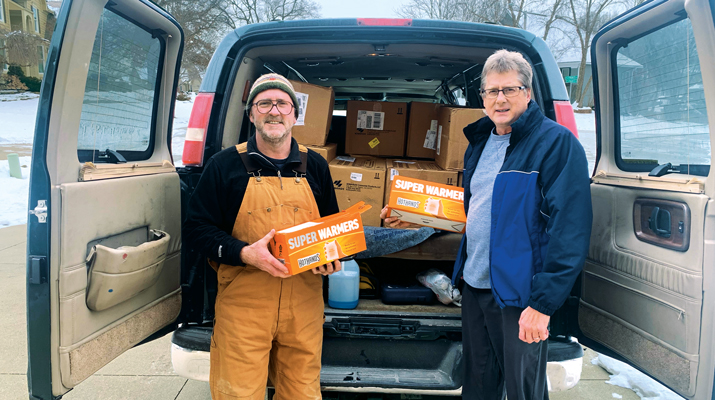Web of potential exists for propane marketers in digital age
A retired couple is moving across states and settling in your territory, and it will be choosing a propane provider for its home.
The couple, because it’s new to the area, isn’t familiar with propane as a heating fuel, and it doesn’t know of any propane providers. So the two do a Google search for “propane” plus their new city and state.
Will your company’s name pop up? If so, will your company’s name display prominently in such a Google search? If your answer to either of these questions is “no,” now is the time to develop a more effective web strategy – or, for many marketers, take a first step into the digital arena.
“[The industry] is probably a little bit behind other industries,” says Bonnie Walker, an info-tech specialist at Propane Resources, which helps propane marketers promote their businesses online. “[The industry] still has a number of people who don’t have an Internet presence and have not found the value in it. They think spending $3,000 or $4,000 is too expensive for marketing.”
Some marketers resist the Internet and related digital technologies because they insist they know their customers so well that investing money and resources in this area is unnecessary. But do you really know your customers? And, perhaps more important to growing your business, do you know whom your next customers are? Odds are your customers’ needs are continuously changing like most consumers’ needs.
Your changing customers
According to Walker, one difference between today’s propane customers and the ones from just a few years ago is that modern consumers expect to have the option to pay their bills online.
“The number one question asked is how do I pay my bill online if [a company] doesn’t have web pay,” Walker says. “People want to put points on their credit card. They also do their business at night and on weekends.”
Indeed, consumers want to pay bills on their time – and pay them as quickly and conveniently as possible. As Walker points out, as Generations Y and Z become propane customers, the typical customer expectation will become one that demands online bill paying.
“We’ve all made the assumption that we should be able to pay online, whether it’s EFT (electronic funds transfer), credit card or through another means,” she says. “If a company doesn’t offer payment online, the younger generation will go to somebody who does.”
Steve McKay, CEO of Bastrop, Texas-based Sharp Propane, agrees with Walker’s assessment of online bill pay. He agrees because Sharp Propane has experienced its own demand for it.
“As a customer-service tool, we are hearing loud and clear the demand to be electronic and paperless,” McKay says. “Other utility providers – sewer, water – are online now. Their customers’ banking is online. Customers don’t want to sit down and write out one check after another when they can pay 20 checks electronically.”
Online bill paying isn’t the only reason propane marketers should have a website, though. The Internet is simply another means to promote all-things propane – from the many products propane fuels to the upstanding people who make up your company.
“Anytime you’re doing a website, the first thing you need to think about is what do you want to tell your customer,” says Kay Howell, chief information officer at the Propane Education & Research Council (PERC). “I usually suggest [marketers] sit down with a piece of paper and jot down a few words. Somebody is searching for ‘propane’ or ‘heating fuel,’ and I tell them to think about the words somebody might type into a search bar if they’re looking for your company.
“When you finish that list, go to your website and make sure the words are part of the website.”
Getting started
Two components many marketers incorporate into their websites are their company histories and information about their teams.
According to Walker, these webpages – often called About Us pages – are one of the most popular parts of marketer websites.
“The number one most-visited place on our customers’ websites is the About Us section, where there are [team] pictures,” Walker says. “Customers are just curious whom they’re dealing with.
“I tell a lot of people that propane is propane. We can’t enhance the propane. What we do have is the teams out there – and that’s what separates marketers. They have drivers and [customer service representatives], and it’s important to showcase them to the community.”
One resource that can help populate company websites and Facebook pages with content is PERC’s Propane Marketer Resource Catalog (MaRC). The MaRC, available at www.propanemarc.com, offers various photographs and videos marketers can use for their own websites free of charge.
“There are a lot of nice resources for a company that knows how to put a website together,” Howell says. “They can grab those materials and put them on a website.”
Of course, many marketers don’t have the skills to design and launch their own websites. But having a lack of digital knowhow is no longer an excuse for not having a website – and an effective one at that.
“Developing websites does require some technical skills that smaller marketers don’t have,” Howell says. “But the good news is in any location, regardless of whether you’re in a large metropolitan area or a smaller town, because websites are important to all businesses, you will find good development companies at very reasonable prices. Find that company and work with them, because websites are a very important part of how people find you.”
Facebook is another great place to showcase employees or anything business related through photographs, Walker adds.
“People are going to Facebook to be entertained,” she says. “For us, we apply a portion of the [Facebook] gallery to the [marketer] websites to make sure customers who don’t have Facebook pages aren’t missing anything.”
Another high-traffic area of marketer websites is a section that lists and explains various programs in which customers can participate. Customers want to know how they can pay marketers, so clearly stating this information somewhere is a must, Walker says.
Going a step further
Driving visitors to your website is a key component to the web equation, as well. Developing a website is one challenge, but getting potential customers to visit it is a completely different one.
One way to drive traffic is through an e-newsletter. Of course, you’ll have to possess or develop a database of customer email addresses to which you can send an e-newsletter. But e-newsletters are another way to keep your company on customers’ radars, as well as position specific messages to an audience.
Sharp Propane’s McKay is one marketer who has some experience in this area. His company has two e-newsletters, in fact. One is sent to a list of community influencers – mayors, school board members and chamber of commerce members – to keep them in the loop about all-things Sharp Propane.
Sharp Propane’s second e-newsletter, one that’s emailed to realtors, is more targeted.
“We focus on realtors because they are influencers,” McKay says. “Here’s a typical example: Realtors are selling a home to someone coming from Illinois to Austin, Texas. Well, that person doesn’t have a clue about propane providers – they’ve probably never been in a propane home because they’ve never used propane.
“That realtor can be a big influencer into perceptions that customer has about propane and who they can use as a provider.”
In addition to e-newsletters, Sharp Propane maintains a secondary website, www.thinkaboutpropaneonce.com, which educates customers and the public about propane. Visitors can submit propane-related questions to the site and receive answers from the Sharp Propane team.
“Some people know very little about propane and have lots of questions,” McKay says. “Can I have a clothes dryer? Can I cook with propane?”
Having the site, which projects Sharp Propane as an expert on propane, has drummed up new business for the Texas marketer.
SIDEBARS
A take on social media
Although Steve Ahrens, executive director of the Missouri Propane Gas Association, realizes many of his members aren’t active on social media, his attitude is that the association should be on forums like Facebook, Twitter and LinkedIn because some members do participate in these areas.
“If someone’s going to search for propane, we just might have something that’s relevant,” Ahrens says.
Ahrens uses an app called Hootsuite, a social media dashboard that lets him project messages to Facebook, Twitter and LinkedIn. He looks for content he thinks propane marketers will have an interest in, and through Hootsuite he shares this content in the three forums.
“I don’t know if it’s a good social media strategy, putting the same thing on Twitter, LinkedIn and our Facebook page,” he says. “I try to find something out there for people who follow us. Also, it keeps me engaged in some broader topics.”
Controlling your Facebook message
Facebook is an ideal forum for propane marketers to share photos related to their business and interact with customers in a somewhat unique forum. But Facebook, by design, can present problems for any business with a company page.
One problem that can arise is the occasional negative comment on a Facebook wall – for all of a company’s followers to see. Negative comments can entail a range of issues, from customers who are upset about missed deliveries to ones with an axe to grind over their latest bills.
Propane marketers can address such public comments in a variety of ways, but Bonnie Walker, info-tech specialist at Propane Resources, says there’s one obvious response to address venting customers on Facebook.
“The only thing they can do is respond to it,” Walker says. “Respond; otherwise it’s bad for everybody because it’s an open forum.”
Walker, who’s helped multiple marketers transition into the social media arena, says that in her experience few marketers have dealt with much backlash on Facebook from upset customers.
“We have been so fortunate because of the types of businesses propane marketers are,” Walker says. “We just don’t see a lot of complaints. They’re few and far between because [marketers] are generally really good with their customers. If you polled a bunch of retailers, the bad is either nonexistent or so low that the one they did get probably drove them crazy. And it was probably something minor anyway.”
















